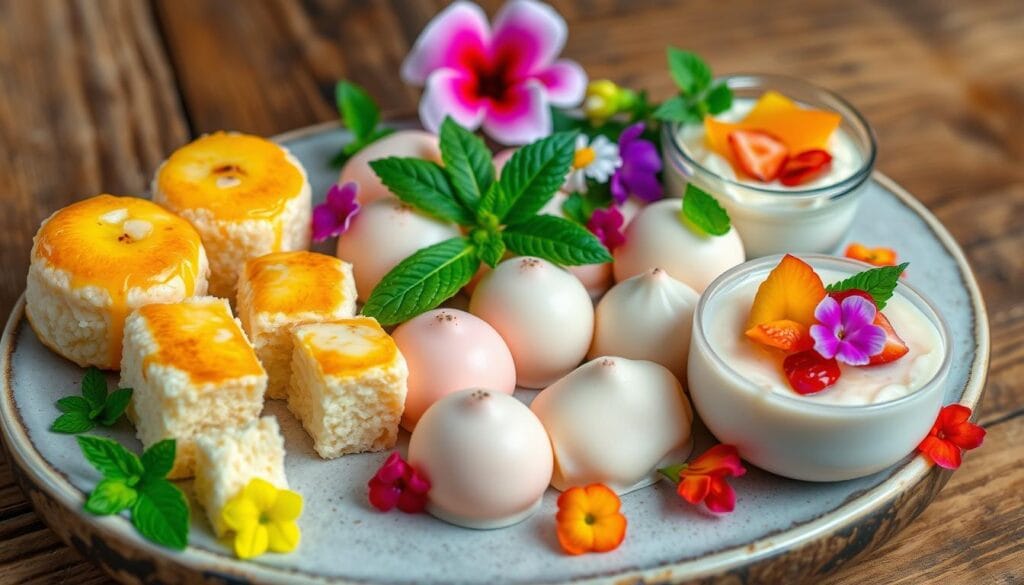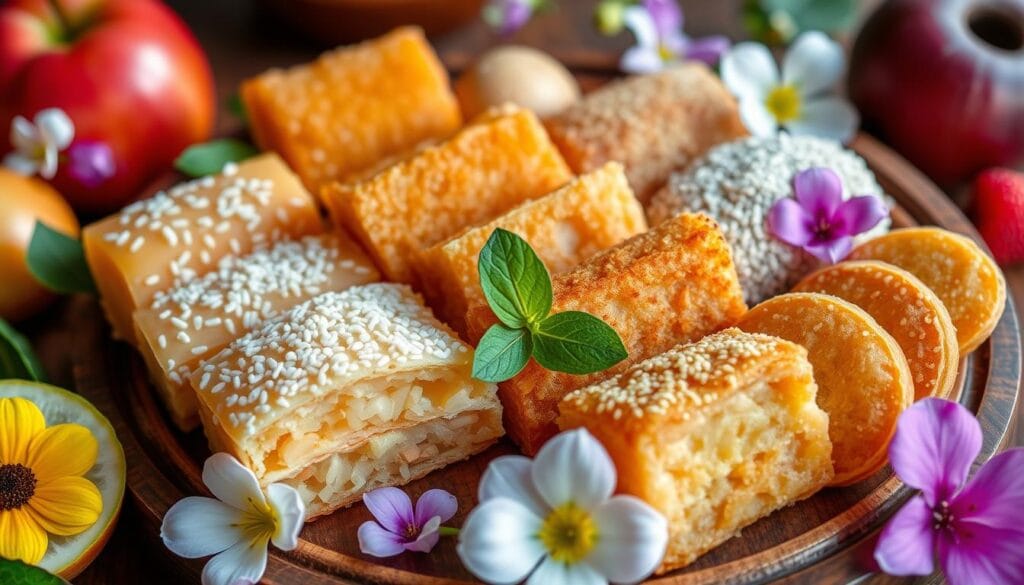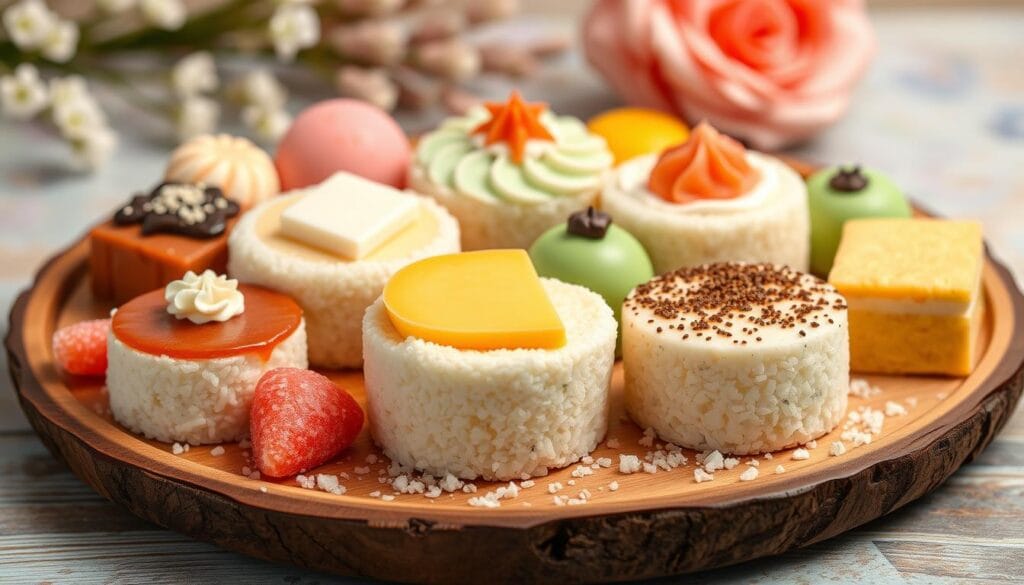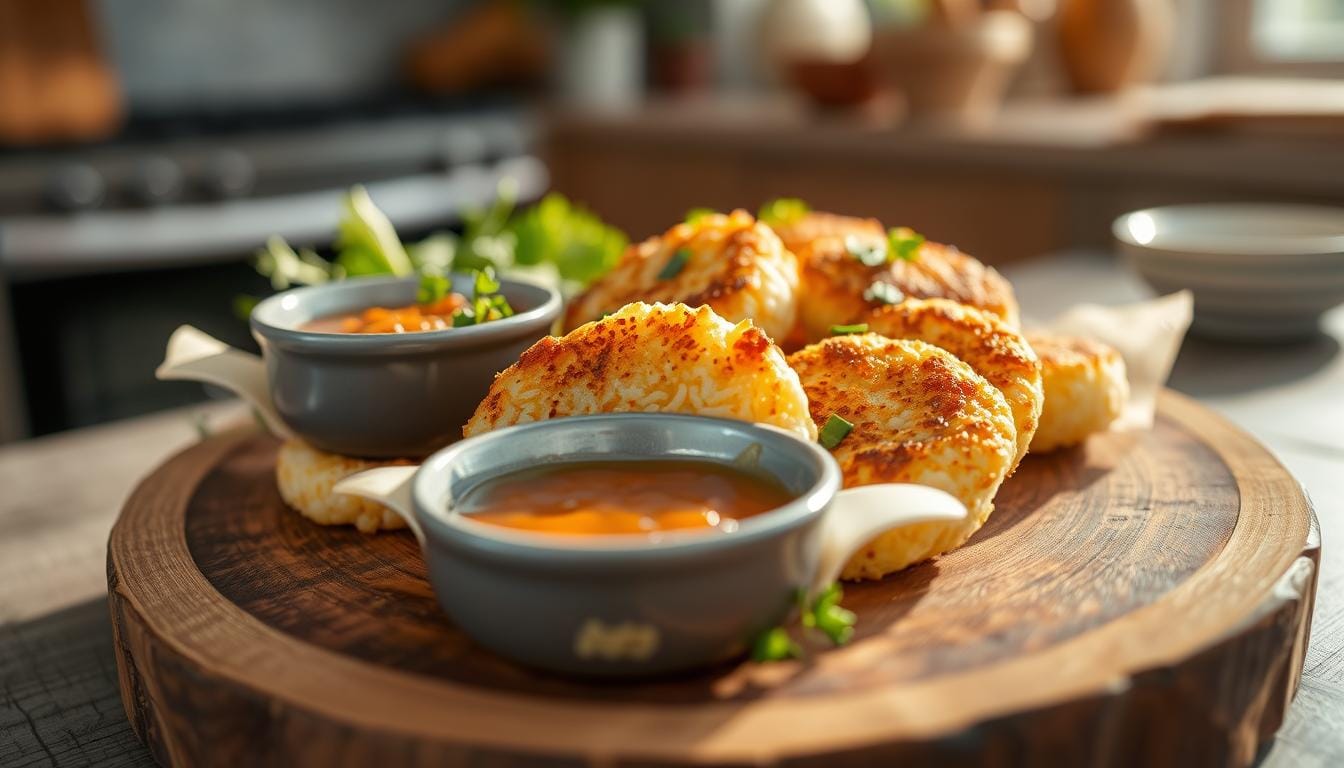Asian cuisine offers a wide range of sweet treats that will excite your taste buds. You can find everything from cheese rice cakes to gluten-free desserts. These treats are perfect for anyone looking to indulge without worrying about dietary restrictions.
In many Asian countries, desserts are a big part of the cuisine. Fruits like jackfruit, lychee, and mango are used in sweet dishes. You can also try unique desserts like coconut jelly and coconut sticky rice, especially in Vietnamese desserts.
Exploring Asian desserts, you’ll find many gluten-free options. With more people following gluten-free diets, many restaurants now offer gluten-free desserts. These are made with ingredients like rice flour and coconut milk, making them both delicious and healthy. So, why not try a gluten-free cheese rice cake or a savory snack?
Key Takeaways
- Asian cuisine offers a wide range of sweet treats, from cheese rice cakes to savory snacks.
- Many Asian desserts are made with gluten-free ingredients, making them a great option for those with dietary restrictions.
- Popular fruits like jackfruit, lychee, and mango are used in a variety of sweet dishes.
- Coconut jelly and coconut sticky rice are unique desserts that are prominently featured in Vietnamese desserts.
- The average price of a signature crispy rice dish is $26, making it an affordable option for those looking to try Asian desserts.
- Gluten-free desserts are becoming increasingly popular, with many Asian restaurants now offering gluten-free options made with ingredients like rice flour and coconut milk.
Introduction to Asian Cuisine Desserts
Asian desserts are famous for their unique flavors and textures. They often use healthy ingredients and simple recipes. You’ll find a wide range of homemade treats that are both tasty and good for you. From classic mochi and red bean paste to new fusion desserts, there’s something for everyone.
Asian desserts rely on natural ingredients like coconut milk, rice flour, and sweetened condensed milk. These add flavor and texture while also being good for you. For instance, coconut milk is full of healthy fats, and rice flour is rich in fiber. Making your own desserts with these ingredients means you can enjoy treats that are both delicious and healthy.
Some popular Asian desserts you can easily make at home include:
- Mochi ice cream, made with pounded rice and filled with green tea or mango ice cream
- Coconut rice pudding, flavored with pandan leaves and sweetened with palm sugar
- Red bean paste-filled cookies, made with rice flour and sweetened condensed milk
With these easy recipes and healthy ingredients, you can make your own Asian desserts. Enjoy the unique flavors and textures of this vibrant cuisine.
| Dessert | Ingredients | Health Benefits |
|---|---|---|
| Mochi ice cream | Rice flour, coconut milk, green tea | High in fiber, healthy fats, and antioxidants |
| Coconut rice pudding | Coconut milk, rice flour, pandan leaves | Rich in healthy fats, fiber, and vitamins |
Famous Asian Desserts You Must Try
Asian desserts are famous for their crispy texture, tasty flavors, and savory snacks. They range from traditional sweets to modern twists. There’s something for everyone to enjoy.
Popular desserts include mochi, mango sticky rice, egg tarts, and red bean buns. These treats offer a mix of textures and flavors. They are sure to delight your taste buds.
A Chewy Delight: Mochi
Mochi is a traditional Japanese dessert. It’s made from pounded glutinous rice. It has a soft, chewy texture and is often filled with sweet fillings like red bean paste or ice cream.
Tropical Bliss: Mango Sticky Rice
Mango sticky rice is a classic Thai dessert. It’s made with glutinous rice, fresh mango, and coconut milk. It’s a sweet and creamy treat perfect for warm weather.
A Flaky Treat: Egg Tarts
Egg tarts are loved in many Asian countries, including China, Japan, and Korea. They have a flaky crust and a creamy egg custard filling. They’re a delicious and savory snack.
Sweet and Savory: Red Bean Buns
Red bean buns are a type of Asian dessert. They combine sweet and savory flavors. They’re made with a soft, fluffy bun filled with a sweet red bean paste. They’re perfect for any time of day.
| Dessert | Preparation Time | Difficulty Level | Servings |
|---|---|---|---|
| Mango Sticky Rice | 50 minutes | Easy | 4 servings |
| Strawberry Mochi | 45 minutes | Intermediate | 10 pieces |
| Egg Tarts | 30 minutes | Easy | 6 tarts |
Regional Specialties: A Delicious Exploration
Exploring Asian desserts reveals a world of regional specialties. These show off the unique tastes and ingredients of each place. You can make tasty, gluten-free, and healthy ingredients-based desserts at home.
Chinese desserts often use rice flour and coconut milk. These are gluten-free and add a creamy texture. Visit rapidessert.com to learn more and find easy recipe ideas.
Some popular regional specialties include:
- Chinese desserts, which often feature ingredients like rice flour and coconut milk
- Japanese sweets, which are known for their delicate flavors and beautiful presentation
- Thai desserts, which often combine sweet and savory flavors with healthy ingredients like coconut milk and fresh fruit
Exploring these specialties lets you create unique desserts. Use gluten-free and healthy ingredients to impress everyone. With practice, you’ll master Asian desserts and wow your loved ones with your easy recipe creations.
Ingredients That Define Asian Desserts
Creating delicious Asian desserts at home requires key ingredients. Rice flour, coconut milk, and sweetened condensed milk are must-haves. They give desserts a crispy texture and delicious flavors that are quintessential.
Start by checking out your local Asian market or Korean grocery store. Rice flour is crucial for Korean desserts like tteokbokki. Coconut milk adds a creamy texture to many desserts. Mixing these with sweetened condensed milk lets you craft a variety of delicious flavors and textures.

For those eager to make Asian desserts at home, there are many resources online. Websites like rapidessert.com offer recipes and tutorials. With practice and patience, you can impress your loved ones with homemade Asian desserts.
Rice Flour: Versatile and Delicious
Rice flour is a key ingredient in many Asian desserts. It’s versatile, making everything from crispy cookies to delicate cakes. It’s a great choice for creating a variety of delicious flavors and textures.
Coconut Milk: Rich Creaminess
Coconut milk is essential in many Asian desserts. It adds a rich, creamy texture that’s irresistible. Whether it’s mango sticky rice or coconut ice cream, coconut milk enhances delicious flavors and crispy texture.
Sweetened Condensed Milk: A Creamy Sweetener
Sweetened condensed milk is a favorite in many Asian desserts. It brings a sweet, creamy texture that’s hard to resist. From Vietnamese coffee to sweetened condensed milk ice cream, it’s perfect for adding delicious flavors and crispy texture.
The Role of Festivals in Asian Desserts
Exploring Asian desserts reveals a strong link to festivals and celebrations. During Lunar New Year, savory snacks like dumplings are enjoyed. They are seen as lucky foods. In Japan, mochi and manju are served during New Year (Oshogatsu). These sweets are made with gluten-free rice flour.
Mooncakes are a highlight of the Mid-Autumn Festival. These pastries have a rich filling, often red bean paste or lotus seed paste. They’re best with a cup of tea. Making traditional Japanese mochi at home is an easy recipe. You can fill it with red bean paste or ice cream.
Want to make Asian-style desserts at home? There are many online resources, including recipes and tutorials. With practice and patience, you can make delicious desserts for any occasion.
Popular Techniques in Asian Dessert Preparation
Asian desserts use many techniques to achieve different textures and tastes. It’s key to use healthy ingredients and prefer homemade options for their freshness. Steaming is a favorite method as it keeps the natural flavors and textures intact.
Frying is another technique that adds a crispy texture to desserts like fried mochi or sesame balls. Chilling is used to make desserts like mango pudding or coconut ice cream cool and refreshing.
Some popular Asian desserts and their preparation techniques include:
- Steamed buns with sweet fillings
- Fried dumplings with red bean paste
- Chilled desserts like mango pudding or coconut ice cream

By using these techniques and choosing healthy ingredients, you can make a variety of tasty Asian-inspired treats at home. Whether you like steamed, fried, or chilled desserts, there’s something for everyone to enjoy.
| Dessert | Preparation Technique | Ingredients |
|---|---|---|
| Steamed Buns | Steaming | Flour, sugar, yeast, fillings |
| Fried Dumplings | Frying | Flour, sugar, oil, red bean paste |
| Mango Pudding | Chilling | Mango, sugar, cream, gelatin |
Modern Takes on Traditional Asian Desserts
Exploring Asian desserts reveals a variety of modern twists on old favorites. You’ll find easy recipe ideas and gluten-free options for everyone. The trend of savory snacks is especially exciting, offering tasty solutions for cravings.
Fusion Desserts: A Creative Twist
Fusion desserts blend traditional Asian flavors with new tastes and methods. Try making gluten-free mochi with sweet red bean filling. Or, pair crispy rice cakes with spicy Korean chili flakes for a savory snack.
Vegan and Vegetarian Options: Inclusive Treats
Vegan and vegetarian Asian desserts are gaining popularity. These easy recipe ideas cater to dietary needs without sacrificing taste. Enjoy gluten-free rice flour cakes, roasted chestnut savory snacks, or sweet potato desserts perfect for fall.
| Dessert | Ingredients | Description |
|---|---|---|
| Mochi | Gluten-free rice flour, sweet red bean filling | A traditional Japanese dessert with a modern twist |
| Rice Cakes | Crispy rice cakes, spicy Korean chili flakes | A savory snack perfect for satisfying your cravings |
| Sweet Potato Dessert | Sweet potatoes, gluten-free rice flour, coconut milk | A delicious and easy recipe idea perfect for the fall season |
Healthier Asian Dessert Alternatives
Asian desserts are often seen as sweet and rich. But, there are healthier options that are just as tasty. Try using honey or maple syrup to cut down on sugar.
Gluten-free Asian desserts are a great choice. They can be as tasty as the traditional ones. You can make gluten-free mochi or sesame balls for a crispy treat.

For inspiration, check out rapidessert.com. You can also try new ingredients and flavors. With practice, you’ll make healthy, crispy desserts that taste amazing.
Try naturally sweetened desserts like fruit-based ones or gluten-free rice flour treats. They’re healthier and just as tasty as traditional ones. So, why not try making some crispy, delicious homemade desserts?
DIY Asian Dessert Recipes
Creating delicious Asian desserts at home is now easier than ever. Thanks to easy recipe platforms, you can use healthy ingredients and try new savory snacks. For a unique treat, try making Cheese Tteokbokki, a Korean dish with rice cakes. This recipe serves 4 people and is ready in just 50 minutes.
To make the cheese sauce, you’ll need plant-based butter, garlic, flour, and spices. The recipe also includes healthy ingredients like oat cream and kombu dashi. For the casserole, you’ll need Korean tteok rice cakes, deep-fried tofu puffs, and vegetables like broccoli and mushrooms.
Here are some tips for perfecting your DIY Asian desserts:
- Use high-quality ingredients for the best flavor.
- Experiment with different savory snacks and sweet ingredients.
- Don’t be afraid to try new recipes and flavors.
By following these tips and using easy recipes, you can make delicious and healthy Asian desserts at home. So why not give it a try and indulge in some savory snacks and sweet treats?
| Ingredient | Quantity |
|---|---|
| Plant-based butter | 60 grams |
| Garlic | 12-16 cloves |
| Flour | 4 tablespoons |
Pairing Asian Desserts with Beverages
Enjoying Asian desserts is even better with the right drink. Try pairing your favorite desserts with tea or coffee. For a gluten-free choice, make a homemade tea blend that goes well with your dessert.
A crispy texture is common in many Asian desserts, like cookies or pastries. Pair these with a creamy coffee drink for a better experience. Options include Taiwanese Oolong Milk Tea or Vietnamese Iced Coffee Ice Cream.

- Pair sweet desserts with a savory drink, like green tea or coffee, for balance.
- Choose a drink with a similar texture to your dessert, like creamy coffee or crunchy snacks.
- Try different flavors and combinations to find your favorite.
By trying these tips and pairings, you can make your dessert experience even better. Whether it’s a homemade tea or a store-bought coffee, there’s a perfect match for you.
Conclusion: Satisfy Your Sweet Tooth with Asian Delights
As we wrap up our journey through Asian cuisine desserts, we hope you’re excited to try new things. Discover the unique tastes and textures these desserts offer. From cheese rice cakes to savory snacks, there’s a world of flavors waiting for you.
Looking for gluten-free options or wanting to try something new? Asian desserts are full of cultural richness and creativity. They’re not just tasty but also good for you. With simple recipes and tips, you can make these desserts at home.
Ready to explore the world of Asian desserts? Let your taste buds lead the way. Enjoy a mix of flavors, textures, and healthy choices. Indulge in the sweet delights Asia has to offer.

1 réflexion au sujet de « Explore the Sweet Side of Asian Cuisine: Tempting Desserts »